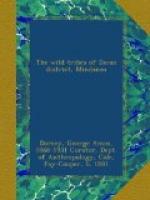“The men gathered close around the poles, but the women and children stood at a distance. Karan took his stand just back and to the right of the victim, and Umook stood in front on the left side. Both unsheathed their knives and then they called upon the spirits Dwata, MElu and Lamot ta Mangayo to look and see that they were killing the man because of his great fault; if this were not true they surely would not kill him.[2] At this point Saligon, the victim, told the men that he was not afraid to die, that if they killed him, their fault would be great, but that if they would release him, he would return at once to his home in Bilawan and would not cause them any trouble because of what they had proposed to do. When he stopped talking, Karan struck him from in front just below the ribs with his fighting knife, and Umook struck him from in back. The other men present who were willing to pay for the privilege then struck at the body with their knives. The body was then cut down and buried in a shallow grave already prepared for it. No parts were carried away, although in some cases the women take the long hairs of the victim and sew them in the designs on the men’s trousers in place of black thread."[3]
[2] The informant here added that if the man had not been guilty, Karan and Umook would surely have been punished with sickness; but since they were not ill, it is certain that he was bad, and that Dwata had taken his body up and would not punish his murderers.
[3] The informant further volunteered, that the Bila-an make a sacrifice every two years, and that several years ago his uncle named KE was the victim. At that time he was too young to remember the details.
Datu Baklay who now lives near the Padada river, but was formerly a resident of the Malalag cogon plains, claims that the ceremony is not a yearly event, as is the case with the Bagobo, neither does it follow each death; but if the deceased has been a person of great importance or a member of the ruler’s family it should take place in eight days, regardless of the phase of the moon or the position of the stars. He further insists that neither Balatik nor any other constellation governs the time of an offering, nor does such a ceremony insure better crops or success in war. He describes the sacrifice following the death of Datu Kalayan, his father, as follows:
“A Bila-an slave was purchased for one agong and preparations made for a sacrifice. A small house without floor or sides was built in the forest some distance from the town, and in this were two upright poles which supported a crossbeam at a height of about seven feet. Near them and inside the house a shallow grave was dug and then the victim was brought in. He was tied to the horizontal pole, hands crossed one on each side of the beam. The men filled the house, leaving a free place only near the victim, and the women and children crowded close around in the yard. After addressing the spirits, Lamot ta Mangayo, MElu, and Dwata, I placed my spear to the man’s side, and then all the male relatives took hold of the shaft and at my signal forced the weapon through the body. Other men then cut at the body with their knives, finally releasing it from the pole. While it lay on the ground the women and boys were allowed to enter the house and throw spears at it, after which it was buried.”




